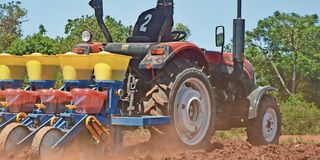Agronomist notebook: Get it right on farm labour

In a farm, sometimes a worker’s dissatisfaction impedes on their productivity and hence the employer should be concerned about productivity and the workers' welfare. PHOTO | FILE | NATION MEDIA GROUP
What you need to know:
- Many farmers have thus embraced herbicides to control weeds to reduce the cost of labour. However, herbicides cannot be used in all stages of crop production.
- Labour on the farm carries the highest percentage of the total cost of production and there exists a direct correlation between employee productivity and farm profitability.
- Hire farm workers depending on their skills and ability to perform certain activities. Also, consider training them, as this will help in increasing efficiency.
- Employees have a personal life and family to attend to, thus you should provide them with off and leave days to boost morale.
A farmer in one of the WhatsApp groups that I belong to recently lamented of increased cost of production due to high labour charges.
Others shared similar sentiments, noting they were having challenges getting casual labourers due to restriction of movement following the outbreak of Covid-19.
Many farmers have thus embraced herbicides to control weeds to reduce the cost of labour. However, herbicides cannot be used in all stages of crop production.
Usage depends on the crop and the chemicals. For instance, in maize they should be used when the crop is at knee-height. In onions, application of herbicides after one month suppresses the growth of the crop.
Also, if the crop is almost ready for harvesting, herbicides should not be used because of the pre-harvest interval, unless mechanical methods such as hand weeding are done.
Labour on the farm carries the highest percentage of the total cost of production and there exists a direct correlation between employee productivity and farm profitability. This shows the need for a farmer to plan efficiently.
To begin with, make a weekly plan for all activities taking place on the farm, as this helps in understanding and planning for the labour requirement in advance.
Depending on the size of the land, one may consider employing permanent staff.
If the challenge is accessibility to the farm, consider providing means of transport for the workers.
Before starting daily activities, the farm manager needs to demonstrate what is expected to be done. This serves as a guide to other farmworkers. In that case, the manager or supervisor should be hands-on.
Hire farm workers depending on their skills and ability to perform certain activities. Also, consider training them, as this will help in increasing efficiency.
UNDERSTAND THE CHALLENGES
For the permanent staff, have a contract with them that acts as terms of reference and which is binding between you and the employee.
This will make the worker responsible. Theft cases on the farm will also reduce as the employee will provide their documents, making it easy in case of tracing.
A contract also makes one committed to the farm and avoid quitting without giving notice.
Have regular meetings with workers to share your ideas and listen to them, as this puts you on the same page and helps you achieve your goals in production. Motivate farm employees by providing incentives.
Encourage them to participate in decision-making as this will help a long way in labour management.
Understand the challenges your workers are facing and what is affecting them. In case one requires an off-day, offer them.
Employees have a personal life and family to attend to, thus you should provide them with off and leave days to boost morale.
Have protocols that are specific enough to allow employees to know what to do. Show them respect and consistently treat them fairly. Security of tenure and safe working conditions are important for the workers.
In most cases, a worker’s dissatisfaction impedes productivity. The employer should, therefore, be concerned about productivity and people’s welfare.
Workers make mistakes on the farm, which are sometimes costly. However, these blunders can be avoided by selecting knowledgeable, skilled personnel or by providing better orientation, training, management and supervision.
Conduct performance appraisals for the employees and communicate to them as this enables them to improve their work.
Have a medical cover for the employees, even if it is the government-provided National Hospital Insurance Fund, as this will help cater for their medical expenses on the farm in case of injuries, especially while dealing with machinery.
To ensure you do not incur much on labour, develop farm activities target for each activity in regards to the daily minimum wage.
This will guide you on the amount of money to pay casual workers.


